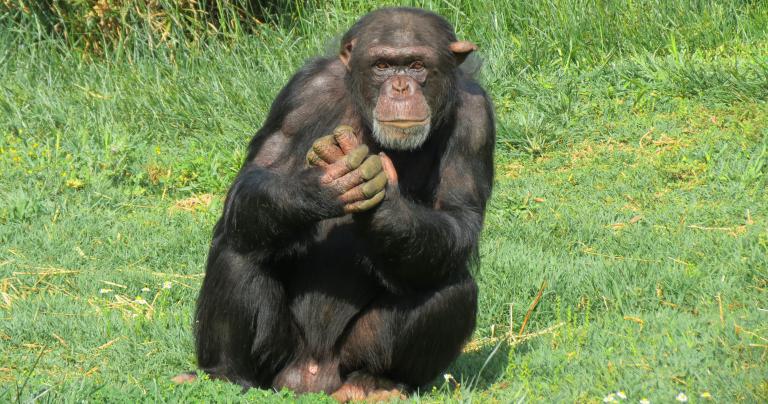Animism is one of the foundations of my polytheist religion. It’s the idea that whatever animates you and me also animates the birds and squirrels, the grass and trees, the wind and rain, and the rivers and mountains.
More than that, it’s the idea that every being in the universe is not a thing but a person, with the inherent dignity and worth possessed by all persons.
Those of us who have companion animals understand this. They’re not “pets” – they’re members of our families. We love them, feed them, and care for them. When they die we mourn them. We talk to them, and they talk back. They don’t speak “human” and we don’t speak “cat” or “dog” but we can still communicate. They are persons and we have relationships with them, just like we have relationships with other humans.
This is a source of annoyance for fundamentalists and other conservative Christians, who insist humans are categorically different from other animals. They argue that we alone are “made in the image” of their God.
Science, of course, tells us something very different. Life originated once on Earth, so we are related to every other living being on this planet. Not only are chimpanzees and bonobos our closest genetic relatives, we are their closest relatives: they are closer to us than they are to gorillas.

Mindedness and personhood
What makes a person is mindedness: perception, awareness, and autonomy. In her excellent book The Wakeful World, Emma Restall Orr describes the mind of a tree.
A tree perceives the world around it. It is aware of gravity, light and temperature, the resources within the soil into which it roots, the availability of water. By the way in which it adapts in order to make the most of its environment, we might say that the tree senses the changes of the seasons, for its perception is visceral sensation, and there is nothing in those words that definitively limits their use to human experience.
The fact that the mind of a tree differs greatly from the mind of a human is a quantitative difference, not a qualitative one.
Indeed, how far can we simplify the parameters in order to use the term mind and succeed in drawing a justifiable dividing line? The answer given by the animist is to decline the invitation to draw that line at all.
The mind of a human is quite different from the mind of a tree, and at least somewhat different from the mind of a chimp. Likewise, the mind of a God is different from our minds, perhaps in ways we cannot comprehend any better than a tree can comprehend our minds.
Avoid anthropomorphization
Relating to non-human persons requires careful attention. On one hand, we must avoid anthropomorphizing them – assigning human attributes to persons who are not human. Part of this is basic respect. The value of other persons doesn’t come from their similarity to us, as nice as those similarities may be. Their value is inherent – they have it simply because they exist.
Occasionally I see people trying to feed their cats a vegan diet – this is abusive and potentially lethal for cats. They can’t get enough protein or amino acids from a totally plant-based diet. Humans are omnivores – cats are carnivores. We can choose to eat only plants – cats don’t have that option. Assigning human attributes to cats can get them killed.

Too often we mindlessly expect other-than-human persons to relate to us like other humans do. Then when they don’t, we decide they’re just mindless things. This is at best a misunderstanding – it might be better to call it arrogance.
From the other end of the spectrum, the Gods aren’t human either. Those who were once living humans are now something different, something more. But we often act like They are human. Even the religions that forbid “graven images” still anthropomorphize their Gods, calling Them “father” and speaking to Them as though They’re just like us.
The Gods are persons, so we can relate to Them as persons. They are not “wholly other” as some Christians claim for their God. But They are not human and if we forget that, we are likely to make erroneous assumptions about Them – assumptions that will limit and possibly harm our relationships with Them.
But we can only relate as the humans we are
Let’s go back to The Wakeful World again:
The way we see the world is not actually the world in itself. What we see is our idea of it.
No mind can perceive nature’s actuality. What is perceived is nature’s raw data processed through the filters of perception established by beliefs based on limitations and experience.
What this means is that even when we relate to a tree-person as the tree it is, even when our foundational assumptions include trees who are persons with their own inherent value and worth, our experience of that tree-person is necessarily filtered through our humanness. Translation is required.
Those who know a bit about language understand that there is no such thing as a neutral translation. Every translation reflects interpretations and judgements made by the translator.
If we can understand what our dogs and cats are trying to tell us – and often we can – it is because they are not so very different from us, and because we spend so much time with them we intuitively understand their non-verbal signals. That familiarity allows us to translate with some accuracy.
If we want to be able to accurately translate what the trees try to tell us, we have to be willing to spend enough time with them to begin to intuitively understand them.
As cats to humans, so humans to Gods
Animism is not a religion. It’s a metaphysics, a worldview, a way of thinking about the universe and how it works. The animistic principles I’ve outlined here (at a very high level) are a foundation for my polytheist religion.
All beings are persons, which means Gods are persons. But Gods are not human persons, and it is an error to conduct ourselves as though They are. They are more – how and how much more is a matter of some debate among polytheists both ancient and modern.
At the same time, we can only relate to the Gods in a human way, because that’s what we are.
All we can do – or at least, all I know we can do – is to be aware of this limitation, especially in our relations with Them. We cannot see Them as They are, we can only see as much as our humanness will allow. Our experiences of Them will always be filtered through our humanness, and our interpretations will always be human interpretations.
Whatever we may learn about the Gods will always be incomplete. This calls for humility, not just in dealing with Them, but in discussing our experiences and the theologies that come from our experiences.
Which is not to say any opinion is a good opinion. Some are better than others, and some are flat-out wrong. But even good opinions are incomplete. Let’s remember that as we converse about Them.

















